|
|
|
Sort Order |
|
|
|
Items / Page
|
|
|
|
|
|
|
| Srl | Item |
| 1 |
ID:
174637


|
|
|
|
|
| Summary/Abstract |
Rapoport's conceptualization of the last, religious wave of four global waves remains highly influential. But it, and other typologies, have placed too little emphasis on the influence of information and communication technologies (ICTs) on the evolution of global jihadist activities. This article makes two new contributions by developing both a new ICT-based typology for understanding jihadist evolutions, and by focusing on successful attacks. Our central argument is that ICTs’ impact on global jihadism has facilitated dramatic transformations of its strategy, organization and tactics since the 1990s, and that these can be understood as four overlapping iterations. ‘Jihadism 1.0’ describes the hierarchical, top-down directed and overseas financed and trained terrorist organizations that conducted iconic attacks at the turn of the millennium. Jihadism has since evolved into ‘Jihadism 2.0’ and then ‘Jihadism 3.0’. Jihadism 2.0 recognizes that a number of smaller, coordinated attacks can have a global impact. Jihadism 3.0 is inspired terrorism that has no links to the central terror organization, utilizing individuals and crude tactics. Finally, jihadism is evolving toward ‘Jihadism 4.0’, or cyberterrorism. We argue this typology provides a useful basis for scholars and practitioners to conceptualize the ICT dynamics influencing global jihadism, and these may be applicable to other global terrorists. The conclusion analyses how counter-terrorism services can respond to these evolutions and charts areas for future research.
|
|
|
|
|
|
|
|
|
|
|
|
|
|
|
|
| 2 |
ID:
174635
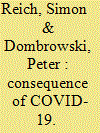

|
|
|
|
|
| Summary/Abstract |
Deliberations over the COVID-19 pandemic's long-term effects on the global balance of power have spurred a large and rancorous debate, including speculation about a shift in the definition of national security and prescriptions about where it should focus. That argument will no doubt continue. But we argue that one consequence is already evident: the United States has spent the last seventy years portraying itself as a security provider in all key domains—for many an intrinsic component of its status as a global leader. One reasonable broad conclusion from the US struggle with COVID-19 is that it has further forfeited its broad leadership position on the basis of its behaviour. Yet that, although possibly true, would only portray one element of the story. The more profound insight exposed by COVID-19 is of a new reality: in a world where both naturogenic and anthropogenic threats pose immense national security challenges, decades of mistaken assumptions and policy choices have created a new environment, one where the United States has been redefined as a security consumer, at least in terms of international public health issues associated with the spread of deadly infectious diseases.
|
|
|
|
|
|
|
|
|
|
|
|
|
|
|
|
| 3 |
ID:
174638


|
|
|
|
|
| Summary/Abstract |
This article traces the origins and evolution of the ideas and concepts associated with the Chinese revolution in military affairs (RMA). It identifies the PLA Daily's ‘Study Military’ column and ‘Military Salon’ as core elements of a future war studies community that has been a major force advocating a forward-looking approach to military studies and defence planning since the early 1980s. It examines their studies and activities, and argues that this community was at the forefront of studying foreign military theories and ideas and introduced RMA-related concepts to China and adapted them to the Chinese context. More specifically, in the early 1980s, they contributed to the reassessing of the international security environment and shaped the Chinese leadership's threat perception, which eventually led to the shift of the People's Liberation Army's (PLA) strategic thought from preparing for imminent all-out war to peacetime army-building. In the late 1980s, they proposed major PLA-wide future war studies initiatives, which resulted in introducing the concepts of local war and high-tech wars into the PLA. They were a major intellectual force that laid the theoretical foundation for the PLA's doctrine of ‘local war under high-tech conditions’, announced in 1993, which paved the way to the RMA with Chinese characteristics.
|
|
|
|
|
|
|
|
|
|
|
|
|
|
|
|
| 4 |
ID:
174640


|
|
|
|
|
| Summary/Abstract |
Women's rights are a core part of a global consensus on human rights. However, we are currently experiencing an increasing popularity of anti-feminist and misogynist politics threatening to override feminist gains. In order to help explain this current revival and appeal, in this article I analyse how anti-feminist communities construct their collective identities at the intersection of local and global trends and affiliations. Through an in-depth analysis of representations in the collective identities of six popular online anti-feminist communities based in India, Russia and the United States, I shed light on how anti-feminists discursively construct their anti-feminist ‘self’ and the feminist ‘other’ between narratives of localized resistance to change and backlash against the results of broader societal developments associated with globalization. The results expose a complex set of global–local dynamics, which provide a nuanced understanding of the differences and commonalities of anti-feminist collective identity-building and mobilization processes across contexts. By explicitly focusing on the role of discursively produced locations for anti-feminist identity-building and providing new evidence on anti-feminist communities across three different continents, the article contributes to current discussions on transnational anti-feminist mobilizations in both social movement studies and feminist International Relations.
|
|
|
|
|
|
|
|
|
|
|
|
|
|
|
|
| 5 |
ID:
174636
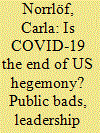

|
|
|
|
|
| Summary/Abstract |
COVID-19 is the most invasive global crisis in the postwar era, jeopardizing all dimensions of human activity. By theorizing COVID-19 as a public bad, I shed light on one of the great debates of the twentieth and twenty-first centuries regarding the relationship between the United States and liberal international order (LIO). Conceptualizing the pandemic as a public bad, I analyze its consequences for US hegemony. Unlike other international public bads and many of the most important public goods that make up the LIO, the COVID-19 public bad not only has some degree of rivalry but can be made partially excludable, transforming it into more of a club good. Domestically, I demonstrate how the failure to effectively manage the COVID-19 public bad has compromised America's ability to secure the health of its citizens and the domestic economy, the very foundations for its international leadership. These failures jeopardize US provision of other global public goods. Internationally, I show how the US has already used the crisis strategically to reinforce its opposition to free international movement while abandoning the primary international institution tasked with fighting the public bad, the World Health Organization (WHO). While the only area where the United States has exercised leadership is in the monetary sphere, I argue this feat is more consequential for maintaining hegemony. However, even monetary hegemony could be at risk if the pandemic continues to be mismanaged.
|
|
|
|
|
|
|
|
|
|
|
|
|
|
|
|
| 6 |
ID:
174630
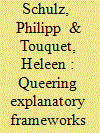

|
|
|
|
|
| Summary/Abstract |
In this article we argue that prevalent explanatory frameworks of sexual violence against men primarily pursue one line of inquiry, explaining its occurrence as exclusively strategic and systematic, based on heteronormative and homophobic assumptions about violence, gender and sexualities. Feminist IR scholarship has significantly complexified our understanding of conflict-related sexual violence (CRSV), documenting its multiple forms and causes across time and space—thereby moving beyond the persistent opportunism-strategy dichotomy and critically engaging with the dominant ‘rape as a weapon of war’ narrative. Drawing on empirical material from Sri Lanka and northern Uganda we queer the current explanatory frameworks, analyzing multiple instances of CRSV against men that both simultaneously seem to confirm and defy categorizations as opportunistic or strategic, while being situated in broader and systematic warfare dynamics and unequal power-relationships. Our empirical material shows that relying on crude categorizations such as the opportunism–strategy binary is unproductive and essentialist, as it tends to mask over the complexities and messiness of deeply gendered power relationships during times of war. Binary strategy/opportunism categorizations also imply broader unintended political consequences, including the further marginalization of sexual violence acts that fall outside the dominant scripts or binary frameworks—such as sexual violence against men with opportunistic underpinnings.
|
|
|
|
|
|
|
|
|
|
|
|
|
|
|
|
| 7 |
ID:
174631


|
|
|
|
|
| Summary/Abstract |
Postcolonial and black feminist scholars have long cautioned against the dangerous proximity between the politics of sexual violence and the advancement of nationalist and imperial projects. In this article, we uncover what it is in particular about efforts to address sexual violence that makes them so amenable to exclusionary nationalist projects, by attending to the political aftermaths of the rape of Jyoti Singh in Delhi in 2012, and the cases of mass sexual abuse that took place during New Year's Eve in Cologne in 2015. Tracing the nationalist discourses and policies precipitated in their wake, we demonstrate how across both contexts, the response to sexual violence was ultimately to augment the securitizing power and remit of the state—albeit through different mechanisms, and while producing different subjects of/for surveillance, control and regulation. We highlight how in both cases it is through contemporary resonances of a persistent (post)colonial echo—which enmeshes the normative female body with the idea of the nation—that sexual abuse becomes an issue of national security and the politics of sexual violence becomes tethered to exclusionary nationalisms. Revealing the more general, shared, rationalities that bind the nation to the normative female body while attending to the located political reverberations that make this entanglement so affectively potent in the distinct contexts of India and Germany helps distinguish and amplify transnational and intersectional feminist approaches to sexual violence that do not so readily accommodate nationalist ambitions.
|
|
|
|
|
|
|
|
|
|
|
|
|
|
|
|
| 8 |
ID:
174632
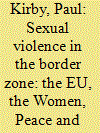

|
|
|
| 9 |
ID:
174628


|
|
|
|
|
| Summary/Abstract |
In 2008, UN Security Council Resolution (UNSCR) 1820 recognized sexual violence as a matter of international peace and security, urging the creation of mechanisms for its prevention and response. Yet serious attention to conflict-related sexual violence occupies an ambiguous place in global politics. Even as the emergence of rape as a global threat has sharpened support for and receptiveness to the Women, Peace and Security agenda, feminist IR scholars have exposed how such attention contributes to the essentializing of women as victims and of victims as always women. The continuing focus on sexual violence as perpetrated on female-marked bodies, allegedly because of their gender and their ensuing place in gendered/sexed orders, has prompted critics to call for the development of more inclusive research and policy framings that transcend the male perpetrator/female victim paradigm.
|
|
|
|
|
|
|
|
|
|
|
|
|
|
|
|
| 10 |
ID:
174639
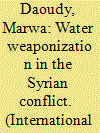

|
|
|
|
|
| Summary/Abstract |
How do actors weaponize water in intrastate conflicts? Existing typologies of water weaponization make deterministic differentiations between state and non-state actors and invoke opaque labels like ‘terrorism’. Furthermore, these typologies ignore how various actors engaged in violent conflict also cooperate over water, and whether water weaponization occurs beyond war. I propose a new typology for water weaponization in an analysis of the case of Syria, drawing on the leaked ‘ISIS papers’ as well as primary sources and interviews. The study begins by charting how the Ba'athist regime used water as a weapon of domination and legitimacy against its Kurdish population with infrastructure that would later facilitate the Islamic State of Iraq and Syria's (ISIS) ability to take hold of northeast Syria. I then turn to how non-state armed groups like ISIS and the Kurdish Democratic Union Party (PYD) have adopted strategies of water weaponization similar to the Syrian government by targeting and channelling water systems with major tactical implications. Finally, I show how enemy parties such as ISIS and the al-Assad regime weaponized cooperative water agreements to advance their mutual interests with violent implications for civilians. As such, I sort strategies of water weaponization into four categories: domination and legitimacy, military tools, military targets, and cooperation. In doing so, this new typology makes three main contributions, by: 1) accounting for how water is weaponized in state-society relations outside conflict; 2) refining existing definitions of water as a military tool and target; and 3) appraising the weapon-like effects of water cooperation.
|
|
|
|
|
|
|
|
|
|
|
|
|
|
|
|
| 11 |
ID:
174629
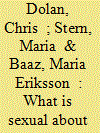

|
|
|
|
|
| Summary/Abstract |
Despite the prominent attention that the problem of conflict-related sexual violence (CRSV) has recently garnered globally, we still know far too little about what is sexual about sexual violence, according to whom, as well as why and how this matters in our efforts to prevent and redress its harms. A growing theoretical, political, legal and ethical imperative to ask questions about the sexual part of sexual violence across both war and peace is nonetheless emerging. This article therefore turns to the accounts of male and female survivors of CRSV at the at the Refugee Law Project (RLP) in Kampala, Uganda. In our reading of their accounts, we explore how the participants understand the possible imbrication of the perpetrator's sexual desire and pleasure with the violence they inflicted, as well as how they deem such intermeshing impossible or deeply problematic in and to the gendered frames that govern how they think about the distinctions between violence and sex, as well as themselves as sexual, social, embodied subjects. Read together, these conflicted and conflicting testimonies offer a vantage point from which to rethink some of the reductive truisms that persist in dominant policy-friendly accounts of wartime sexual violence—namely that such violence is about power and not about ‘sex’. The participants’ accounts thus urge us, as scholars and policy advocates, to resist reducing the multi-layered experiences of victim/survivors of sexual violence to fit into the palatable narratives of victimhood that prevail in humanitarian, juridical and policy spaces.
|
|
|
|
|
|
|
|
|
|
|
|
|
|
|
|
| 12 |
ID:
174641
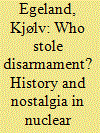

|
|
|
|
|
| Summary/Abstract |
Influential members of the disarmament community have in recent years maintained that further progress towards the international community's nominally shared goal of a world without nuclear weapons depends on recapturing the spirit and practices of cooperation that prevailed in the late 1980s and 1990s. Proponents of abolition, in this view, should focus their efforts on revitalizing the tried and tested arms control formula that was implemented following the end of the Cold War. In this article, I argue that this call to make disarmament great again reflects unwarranted nostalgia for a past that never was, fostering overconfidence in established approaches to the elimination of nuclear weapons. Far from putting the world on course to nuclear abolition, the end of the Cold War saw the legitimation of nuclear weapons as a hedge against ‘future uncertainties’ and entrenchment of the power structures that sustain the retention of nuclear armouries. By overselling past progress towards the elimination of nuclear arms, the nostalgic narrative of a lost abolitionist consensus is used to rationalize the existing nuclear order and delegitimize the pursuit of new approaches to elimination such as the movement to stigmatize nuclear weapons and the practice of nuclear deterrence.
|
|
|
|
|
|
|
|
|
|
|
|
|
|
|
|
| 13 |
ID:
174634


|
|
|
|
|
| Summary/Abstract |
The COVID-19 pandemic affects all countries, but how governments respond is dictated by politics. Amid this, the World Health Organization (WHO) has tried to coordinate advice to states and offer ongoing management of the outbreak. Given the political drivers of COVID-19, we argue this is an important moment to advance International Relations knowledge as a necessary and distinctive method for inclusion in the WHO repertoire of knowledge inputs for epidemic control. Historical efforts to assert technical expertise over politics is redundant and outdated: the WHO has always been politicized by member states. We suggest WHO needs to embrace the politics and engage foreign policy and diplomatic expertise. We suggest practical examples of the entry points where International Relations methods can inform public health decision-making and technical policy coordination. We write this as a primer for those working in response to COVID-19 in WHO, multilateral organizations, donor financing departments, governments and international non-governmental organizations, to embrace political analysis rather than shy away from it. Coordinated political cooperation is vital to overcome COVID-19.
|
|
|
|
|
|
|
|
|
|
|
|
|
|
|
|
|
|
|
|
|